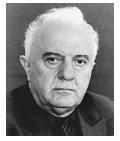GEORGIA
Eduard Shevardnadze
President

(pronounced "ed-WARD sheh-vard-NAHD-zeh")
"Only after we have shown the civilized world our determination to build a democratic society will the West begin actively to help us. The situation is grave. It is a question of saving this nation."
Georgia borders Russia to the north, Armenia and Azerbaijan to the southeast, Turkey to the southwest, and the Black Sea to the west. Its land area is 66,700 sq km (26,807 sq mi). The capital of Georgia is Tbilisi ("tbee-LEE-see").
Georgia's population was estimated at 4,960,951 in 2002. About 70% of the population is ethnically Georgian, 8% Armenian, 6% Russian, 6% Azerbaijani, 3% Ossetian, 2% Abkhazian, and the remainder made up of other ethnic groups. Abkhazians and Ajars have autonomous regions within Georgia despite the fact that they make up a minority of the population in the regions. The predominant church is the Georgian Orthodox Church, in which 65% of the population report membership. An estimated 11% of the population is Muslim.
The decline in Georgia's gross domestic product (GDP)— some 80% over the period 1990–1994—halted in 1995, with the economy growing 5.1% in 1998, led by the construction, oil, and services sectors. The World Bank reported that GDP growth experienced a setback late in 1998. Russia's 1998 financial crisis and the refusal of 90% of Georgians to pay taxes contributed in late 1998 to the substantial devaluation of the lari, price inflation for imports, and a nagging budget deficit that prevented the timely payment of pensions and state salaries. By 2001, the GDP was reportedly growing at a rate of 8.4%, with inflation at 4.6%. Almost all housing and most small enterprises have been privatized, and over 80% of agricultural holdings and medium and large enterprises, though the slow registration of land titles has held back progress. Some port facilities and resource industries have been designated as strategic and the state will retain majority ownership. Exports include scrap metal, machinery, transportation equipment, and agricultural products. Products that thrive in Georgia's Mediterranean climate include tea and oranges. Georgia holds promise as a major north-south and east-west transit area. A pipeline carrying about 100,000 barrels per day from Azerbaijan to Georgia's Black Sea port of Supsa (near Poti) opened in April 1999. In summer 2002, construction began on a pipeline that will link Baku, Azerbaijan, on the Caspian Sea through Tbilisi, Georgia and across Turkey to the Mediterranean port of Ceyhan, Turkey.
ADDRESS
Plekhanova 103
Tbilisi 880064, Georgia
Comment about this article, ask questions, or add new information about this topic: